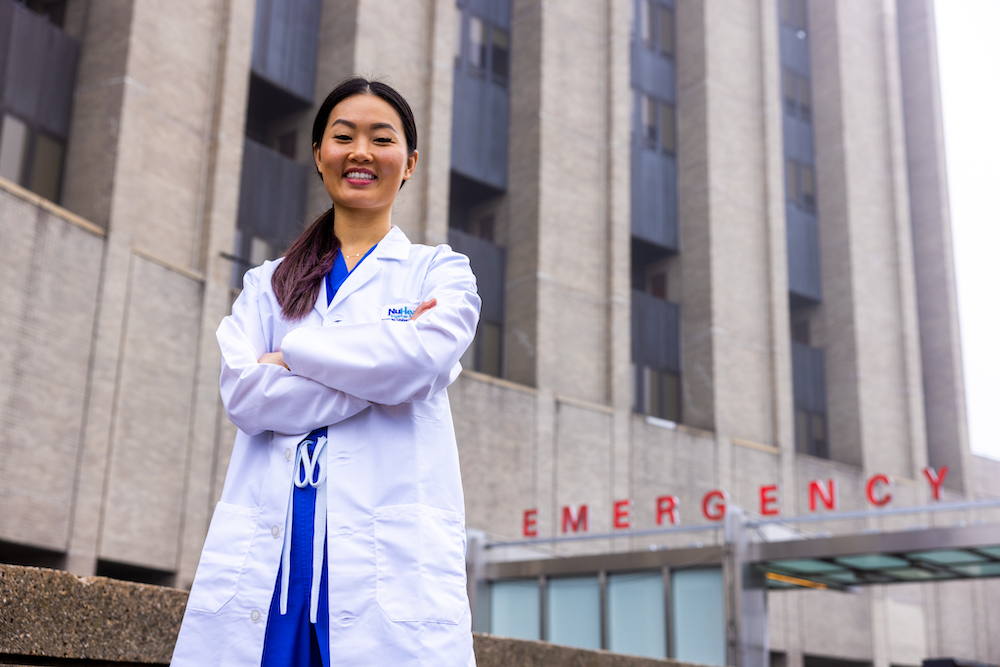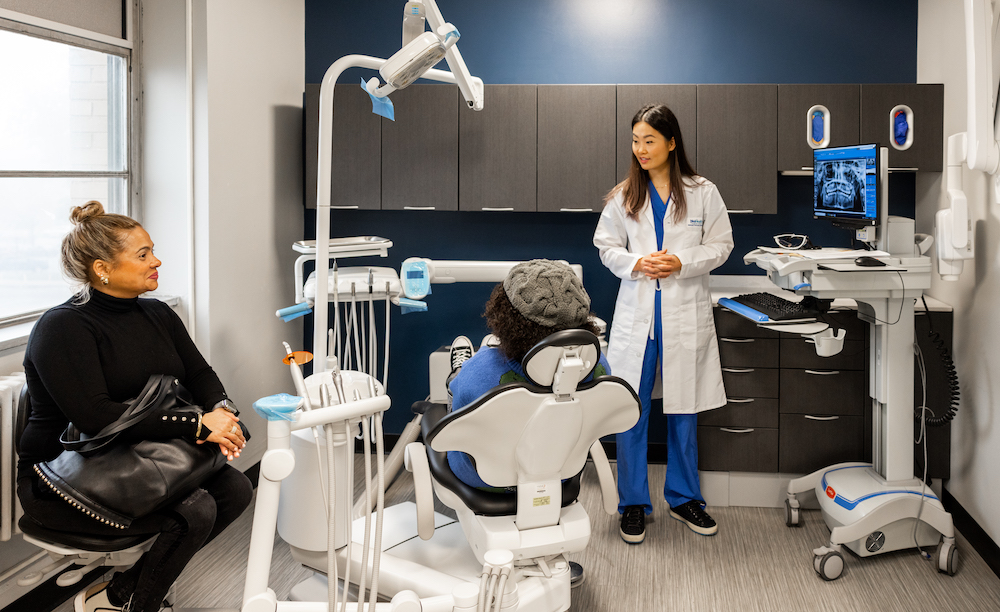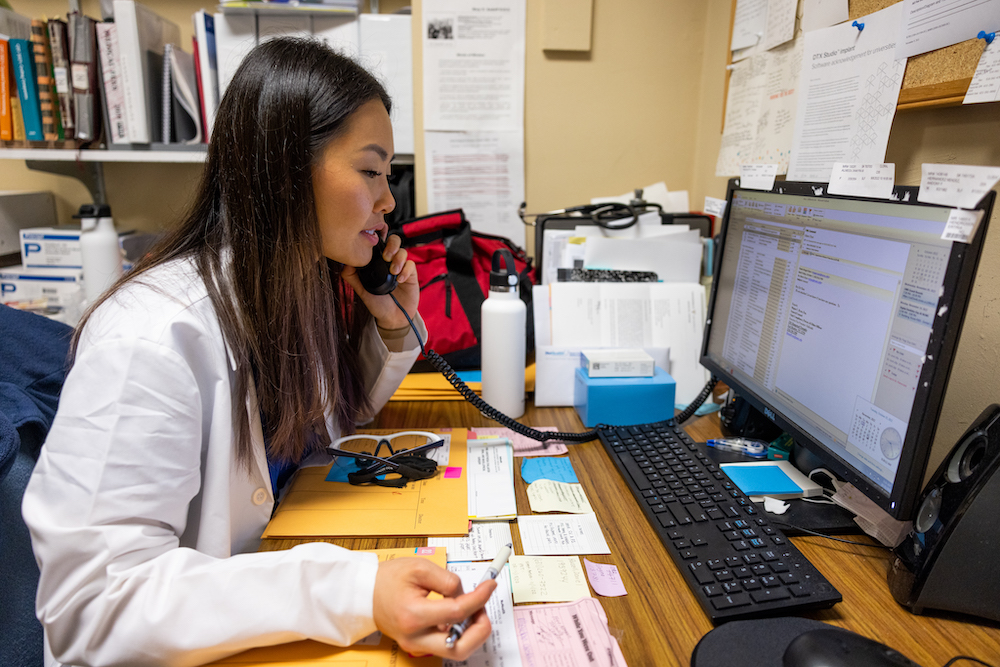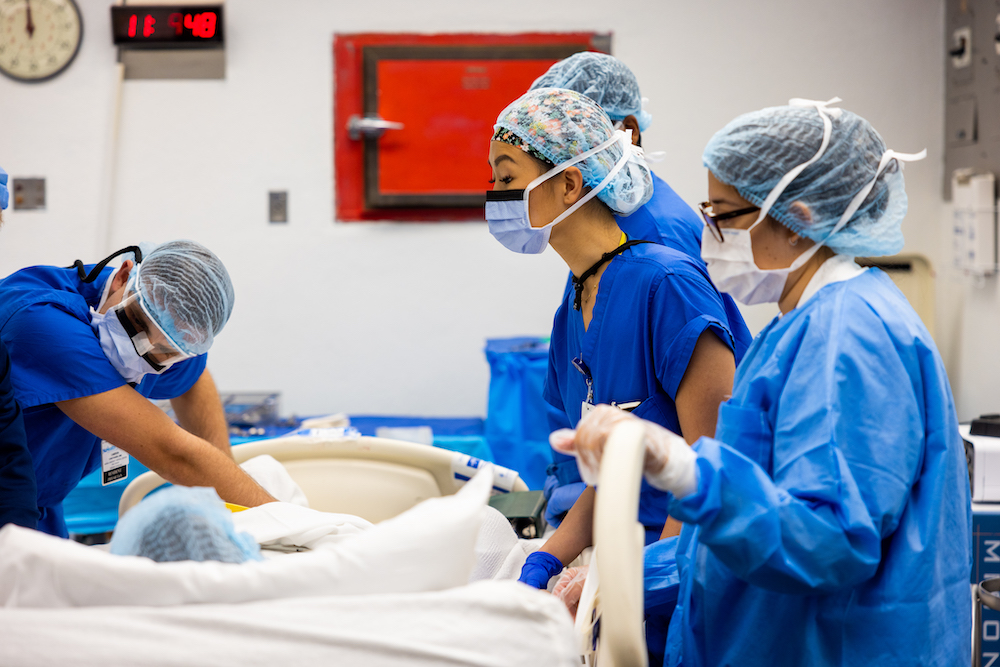Behind Every Surgery is a Life You Change
Jessica Li, Touro College of Dental Medicine ‘20, Is Honored by the Trusts Her Patients Put In Her as an Oral Surgeon
The patient showed up to Nassau University Medical Center’s trauma center in severe pain. He couldn’t eat, talk, or smile; he was barely holding down his job because of the pain in his jaw. Before he came to Nassau University Medical Center (NUMC), he had visited dentists and doctors all over the state and had been misdiagnosed; several of his teeth had been unnecessarily removed.
He was assigned to Jessica Li, a third-year resident in oral and maxillofacial surgery, and a member of the inaugural graduating class of Touro College of Dental Medicine. After conferring with her colleagues, Li quickly had the correct diagnosis.

“He suffered from something called trigeminal neuralgia, which is an extremely painful condition where the trigeminal nerve or a branch of it will just fire unexpectedly and it can cause a significant amount of pain and discomfort for these patients,” recalled Li. “He had a V2 neuralgia, which means the upper portion of his jaw and the middle section of his face was in significant pain. It doesn't mean that when you touch it, it's in pain. It’s pain in every waking moment; he was in tremendous pain.”
Once diagnosed, Li prescribed the correct medication. Weeks later, when the medication stopped working, the patient returned to see Li and asked her what to do. “He told me I was the only person who really tried to help him,” said Li, who then worked with the hospital’s neurology department and was able to schedule him for a complicated brain surgery.
“There's a procedure called a microvascular decompression where you actually make an access into the brain stem or the root of the trigeminal nerve, and you're able to decompress a vessel that's compressing the nerve itself,” she explained. “Fortunately, after a lot of collaboration with our neurosurgery team, we got this patient scheduled for surgery.”

The patient made a full recovery and Li visited him before he was discharged.
“It's incredible to be able to not only treat these patients, but to help them get the type of care that they need, even if I can't be the one to provide that care for them,” said Li. “When I was growing up, my father used to always say, ‘Your life is like a piece of paper with dots on it.’ What he meant is your whole life is made of these experiences and each experience is a dot, and you don't know how it's all going to connect and what the final picture looks like, but the more experiences you have—the more knowledge you have—the more likely you are to be able to connect these dots into a really nice picture. The way I see my training, my time in Touro, and my life in general, is the more experiences I have, the more I can learn. What I learn might not help me this second, but it might make me able to make a difference and help someone later.”
A Childhood in the Dentist’s Office
The daughter of Chinese immigrants, Li recalled growing up in her father’s dental office.
“From a very young age, I was exposed to dentistry,” explained Li, whose parents fled China after the Tiananmen Square Massacre. “I was always in the dental office. All my dad's colleagues were there, and I met so many dentists, so many hygienists, and so many dental assistants. Every day, I saw the basic responsibilities of dentists: filling out patient histories, taking radiographs, getting chief complaints and doing basic restorative work.”
Li’s interest in pursuing a career in dentistry was further piqued by a research class she did in high school where she discovered the long-term negative healthcare ramifications from lack of or poor dental care.

“A lot of my fellow students did cellular biology or chemical research, I was more interested in the clinical aspect,” stated Li. “I gravitated towards something in dental medicine because of my father. I started looking at the different things that occur to the general population. I landed on periodontal disease, gum disease, since it affects 50 percent of Americans. It’s a disease that involves all the supporting structures of your teeth and, when it’s not treated, it can cause systemic health issues.”
While attending Cornell University, Li drifted towards the public policy aspects of dentistry.
“I was interested in the public health side and trying to improve access to care for patients,” remembered Li. “But as I developed that interest a little further, I realized that it was hard for me to communicate these things without fully understanding the niches in dentistry itself.”
While in her final year of school, Li discovered that Touro was opening a new dental school, Touro College of Dental Medicine (TCDM). Touro’s mission of serving the underserved resonated with her as well as the idea of being part of a new school.
“There was so much room to shape our education, to make our mark on the future of the school,” Jessica said. “Yes, there’s some uncertainty in not knowing, but at the end of the day it’s up to you what experience you get out of it. Because they needed people to build a foundation, I knew it was the place I wanted to be.”
In the summer before dental school began, Li travelled to China and worked in the hospital where her father once practiced.
“It was special for my dad to see his daughter go to the program where he trained,” said Li. “It was also great for me in the long run because I didn't have the intention of going into oral surgery at that point. At that hospital, they focused predominantly on head-neck surgery on individuals who suffered from cancer. For many patients they resected large portions of the face. It could be the whole jaw, half of the jaw, their whole tongue, part of their nose, an eyeball, or the whole area around their eye. It was a lot to see for someone who hadn't yet gotten to that level of education.”
Trained at Touro
Li immediately felt at home at TCDM.
“With a new school comes basically a blank slate,” said Li. “So, the school really provided me with an environment to do whatever I wanted. And they supported our class in whatever we wanted to do, whether it was providing us with funding to start student clubs or giving us faculty mentors.” Li launched three clubs during her time at TCDM: a student ambassador organization; an acapella club; and a third that focused on ethical questions in medical practice.

After her first year of dental school, Li returned to China. This time, she worked at a private Taiwanese hospital with an oral surgeon who had also trained with her father.
“This surgeon focused predominantly on cleft lip and palate repair, as well as benign pathology, implants, and some dental alveolar surgeries,” remembered Li. “I had already gotten some foundational, graduate-level science curriculum so I was able to understand more. On top of that, one of my mentors there, another resident, had a good grasp of English, so she was able to communicate to me the intricacies of surgeries. They had a great library and I would spend every evening reading about the surgeries that I had just seen and the surgeries of the next day.”
When Li returned to TCDM, she was inspired and began focusing on surgery. “I really was able to appreciate the scope of oral surgery, which I don't think I appreciated before that experience,” said Li. “As a second-year dental student, I was really interested to learn more about oral surgery and what that field had to offer in America.”
Through her third and fourth years and in externships at hospitals including Touro’s New York Medical College at Westchester Medical Center, Li said she was “exposed to essentially all that America has to offer in the field of oral surgery.”
Li encountered the practical aspects of oral surgery during her clinical rounds as well. Li recalled one dramatic case where she saw firsthand the impact oral surgery can have on a patient’s life. “One of our patients had lost most of her teeth and her facial appearance had completely changed,” stated Li. “We made her dentures, and they thrilled her. Our next step was a surgical intervention where we placed implants in her mouth. Those implants supported a fixed prosthesis, or a fixed denture and she didn't have to worry about the denture falling out of her mouth when she was mid-sentence. When you see these people and you see the lives that you've changed, I think it really makes me, personally, appreciate the work that oral surgeons do for people.”
Supportive mentors inside Touro also made sure she was prepared for whatever her future would include.
“I was very lucky to have many mentors out of Touro, many of whom I still keep in touch with, and many of whom are within the oral and maxilla facial surgery specialty who have made big strides in our specialty,” Li said. “I am very fortunate to have been part of that first class and be given the opportunity to not only grow the school, but to really learn about myself and grow myself in a leadership way.”
The Path to Becoming an Oral and Maxillofacial Surgeon
Oral Surgery is a highly competitive field and Li faced daunting challenges. Nassau University Medical Center only takes one resident per year. Li believed that Touro’s state-of-the-art technology including 3d printers and up-to-date cone beam CT technology gave her an advantage. “It’s very rare to have that equipment,” said Li. “Because Touro College of Dental Medicine is such a new institution, it's been equipped with the state-of-art technology that I was trained on… I was able to work up a lot of cases which were planned completely digitally. I was able to do in-house printing of stents, of surgical guides, and really allow patients to see what type of treatment we could render for them bedside since I could do it on a screen right next to them.”
Touro’s mission and the dental school’s clinic also had an impact on where she chose to apply for her residency. Nassau University Medical Center is a trauma-one center, and most of the patients Li treats are uninsured.
“I think the reason I wanted to go into a program that treats minorities and underserved populations is because Touro College of Dental Medicine, from its inception, from the opening of its doors to the clinic, focused on being able to provide care for the underserved populations,” said Li. “The school had a focus on helping patients who couldn’t get care elsewhere by allowing them to come into the clinic. There were discounted fees available at these clinics, and people really work hard to provide access for these patients. I believe when I was there, they tried to set up some sort of transportation for these patients from the train station to the dental clinic so if a patient needed to take a train or a bus, they would be able to take transportation from that station to even just get to the clinic. And I think that's an incredible resource for a lot of patients who don't have access to anything else.”
Li is the first female resident to be accepted into the program in 30 years and wants to use her role to inspire others.
“I think being a minority in terms of being a female and also being Asian is even more of a privilege for me,” she said. “I feel very grateful to have that opportunity and to show other women who might be interested in going into the field that it is possible.
“What really drew me into surgery and what I love about surgery the most, I think is the impact I have on patients,” said Li. “And it's a really high level of honor to be able to be entrusted in a patient's care. When a patient comes to you and says, ‘I want you to do this.’ For me, that's one of the best feelings because it means that they trust my thought process. They trust the way that I do my surgeries. They trust my patient management abilities. I think surgery goes a lot further than just the technical aspect, just the cutting, the sewing, it's more than that. It's a whole patient. Behind every surgery you do is a patient, is a life that you change.”
Li said that as she finishes her residency and sets out on her career, she plans to follow her father’s example.
“What I admire most about my dad is the time he spends with patients and the importance he places on patient care,” said Li. “He blocks out always, at the very least, an hour to talk to his patients about their treatment plans, alternatives to care, and risks of the treatment that he's suggesting. And he takes that time not only to educate them, but to make sure that they understand the importance because what he really emphasizes is that the work, he provides is two-sided. He can do the work, but the patient must maintain it. I think it's important to educate our patients on what we can do for them, but also what they need to do on their end to make sure that the treatments that are rendered are successful."
[DESCRIPTION] Blank screen with the Touro College of Dental Medicine displays. Jessica Li appears, speaking to the camera from a dental office.
[TEXT] Jessica Li, DDS, Resident of Oral and Maxillofacial Surgery, Nassau University Medical Center, Touro College of Dental Medicine, Doctor of Dental Surgery, '20
[JESSICA LI] My name is Jessica Li and I am a third year resident in Oral and Maxillofacial Surgery at Nassau University Medical Center.
[DESCRIPTION] Jessica walks in front of the Nassau University Medical Center entrance.
[JESSICA LI] I'm a Touro alum from the class of 2020 from the Touro College of Dental Medicine in the inaugural class.
[DESCRIPTION] Photos of Jessica's graduation and time at Touro display.
[JESSICA LI] Going into college, I was more interested in the public health side-- trying to improve access to care for patients. So I went into dentistry more so with the interest of going into public health, going into some sort of application where I could use it to better the population and access to care.
[DESCRIPTION] Jessica walks towards the Emergency Room entrance of the hospital.
[JESSICA LI] When looking for programs to do my training at I was certainly interested in trauma centers. And most level one trauma centers-- I kind of knew coming into this program that I was going to be treating an underserved population.
[DESCRIPTION] Clips of Dr. Li working with patients at Nassau University Medical Center are shown.
[JESSICA LI] Nassau University Medical Center treats a predominantly underserved population. A population where a lot of these patients either don't have insurance or they have emergency Medicaid. And so unfortunately, a lot of these patients don't have good access to care and their only access to any sort of health care is by coming to the emergency room or coming to this hospital, because they don't have the means to afford that treatment elsewhere.
Oftentimes most of our patients, we are their last chance. Behind every surgery you do is a patient, is a life that you change. And for me, seeing that aspect of surgery, I think, is what really drew me to oral and maxillofacial surgery.
Oral and maxillofacial surgeons treat anything in the head and neck area. So as an oral and maxillofacial surgeon, we treat areas from essentially the collarbone and up. Being at a level one trauma facility, that means that we treat any patient that comes into this hospital with a facial trauma. And that can include fractures of the cheek bone, fractures of your forehead. It's really quite extensive. It's a lot more than just oral surgery.
[DESCRIPTION] Dr. Li is shown working with other surgeons in the ER on a patient.
[JESSICA LI] It's very hard to hide your whole face for your whole life. And so, I was able to see how big of a difference in people's lives this makes. When you see the lives that you've changed, it's incredible to watch how people transform. Being able to be the access to care for them is something that, I think, is what makes the field worth it for me.
I had a wonderful experience at Touro. I feel very fortunate to have been part of that first class and be given the opportunity to not only grow the school, but to really learn about myself and grow myself in a leadership way.
[DESCRIPTION] Video clips and photos of Jessica's time as a student at Touro College of Dental Medicine, in class, working with patients, involved with the Touro community, etc., are shown.
[JESSICA LI] Touro College of Dental Medicine, from its inception, from the opening of its doors to the clinic, focused on being able to provide care for the underserved populations. So they had this big focus for helping patients who couldn't get care elsewhere and allowing them to come in.
[DESCRIPTION] Students are shown working with a variety of patients in the Touro College of Dental Medicine clinic.
[JESSICA LI] The emphasis Touro placed on treating the underserved population and trying to help people really resonated with me and inspired me to carry that through into my residency and into my career.
[DESCRIPTION] Dr. Li walks through the hospital halls. She is then shown standing in the OR.
[JESSICA LI] It really made me realize that just one person can make a difference.
[DESCRIPTION] Blank screen with the Touro College of Dental Medicine displays again.
[MUSIC FADES]

